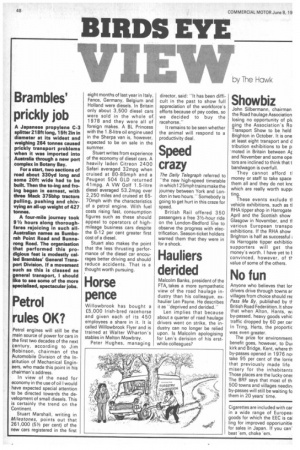V I by The Hawk
Page 50

If you've noticed an error in this article please click here to report it so we can fix it.
Brambles' prickly job
A Japanese propylene C-3 splitter 218ft long, 15ft 2in in diameter at its widest and weighing 264 tonnes caused prickly transport problems when it was imported into Australia through a new port complex in Botany Bay.
For a start, two sections of road about 330yd long and some 20ft wide had to be built. Then the to-ing and froing began in earnest, with three Mack 375bhp tractors pulling, pushing and chivvying an all-up weight of 427 tonnes.
A four-mile journey took 91/2 hours along thoroughfares rejoicing in such allAustralian names as Bumborah Point Road and BunneFong Road. The organisation that performed this prodigious feat is modestly called Brambles' General Transport Division. If a movement such as this is classed as general transport, I should like to see some of the more specialised, spectacular jobs.
petrol rules OK?
Petrol engines will still be the main source of power for cars in the first two decades of the next century, according to Jim Robinson, chairman of the Automobile Division of the Institution of Mechanical Engineers, who made this point in his chairman's address.
In view of the need for economy in the use of oil I would have expected special attention to be directed towards the development of small diesels. This is certainly the trend on the Continent.
Stuart Marshall, writing in Milestones, points out that 261,000 (51/2 per cent) of the new cars registered in the first
eight months of last year in Italy, Fance, Germany, Belgium and Holland were diesels. In Britain only about 3,500 diesel cars were sold in the whole of 1978 and they were all of foreign makes. A BL Princess with the 1.8-litre oil engine used in the Sherpa van is, however, expected to be on sale in the summer.
Stuart writes from experience of the economy of diesel cars. A heavily laden Citreon 2400 Safari averaged 32mpg when cruised at 80-85mph and a Peugeot 504 GLD returned 41mpg. A VW Golf 1.5-litre diesel averaged 53.2mpg over 2,250 miles and cruised at 6570mph with the characteristics of a petrol engine. With fuel costs rising fast, consumption figures such as these should appeal to operators of highmileage business cars despite the 8-12 per cent greater first cost of a diesel.
Stuart also makes the point that the less thrusting performance of the diesel car encourages better driving and should reduce accidents. That is a thought worth pursuing.
Horse pence
Willowbrook has bought a £5,000 Irish-bred racehorse and given each of its 450 employees a share in it. It is called Willowbrook Flyer and is trained at Walter Wharton's stables in Melton Mowbray.
Peter Hughes, managing
director, said: "It has been difficult in the past to show full appreciation of the workforce's efforts because of pay codes, so we decided to buy the racehorse.
It remains to be seen whether the animal will respond to a productivity deal.
Speed crazy
The Daily Telegraph referred to "the new high-speed timetable in which125mphtrainsmakethe journey between York and London in two hours." Somebody is going to get hurt in this craze for speed.
British Rail offered 350 passengers a free 31/2-hour ride on the London-Bedford line to observe the progress with electrification. Season-ticket holders warned them that they were in for a shock.
Hauliers derided
Malcolm Banks, president of the FTA, takes a more sympathetic view of the road haulage industry than his colleague, exhaulier Len Payne. He describes it as "deprived and derided."
Len implies that because about a quarter of road haulage drivers went on strike, the industry can no longer be relied upon. Is Malcolm apologising for Len's derision of his erstwhile colleagues?
Showbiz
John Silbermann, chairman the Road haulage Association losing no opportunity of ph. ging the Association's Ro Transport Show to be held Brighton in October. It is one at least eight transport and d tribution exhibitions to be p • moted in Britain between Ai and November and some ope tors are inclined to think that t bandwagon is overfull.
They cannot afford ti money or staff to take space them all and they do not knc which are really worth supp( ting.
These events exclude tt vehicle exhibitions, such as tl RHA tipper shop in Harrogate April and the Scottish show Glasgow in November, and tt various European transpo exhibitions. If the RHA show Brighton is half as successful its Harrogate tipper exhibitiol supporters will get the money's worth. I have yet to lc convinced, however, of tivalue of some of the others.
No fun
Anyone who believes that or drivers drive through towns ar villages from choice should rez Pass Me By, published by tlBritish Road Federation. It shwa, that when Alton, Hants, wi by-passed, heavy goods vehic traffic dropped by 60 per cer In Tring, Herts, the proportic was even greater.
The prize for environment. benefit goes, however, to Dur kirk and Bridge, Kent, where th by-passes opened in 1976 not take 95 per cent of the lorrie that previously made life misery for the inhabitant Those places are the lucky one5 The BRF says that most of th 500 towns and villages needini by-passes will still be waiting to them in 20 years' time.




















































































































































